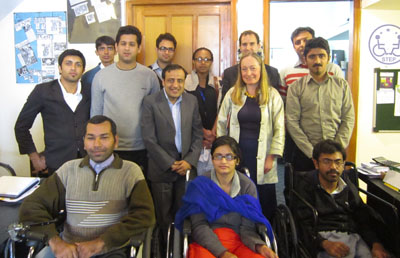6th March 2012 Islamabad, Pakistan
“It’s not about charity”
I first met Atif Sheik in Lahore. He and I were speaking at a British Council event for Pakistani graduates of UK universities. He told me that he campaigned for disabled people’s rights in Pakistan. “It’s not about charity,” he said. It’s about political participation. ” I know,” I said. “I’m disabled too.”.

So back in Islamabad I visited the offices of STEP, the Special Talent Exchange Program, to talk about voting.
To register to vote in Pakistan you need a national identity card. If you are disabled you need to register as disabled before you can get a national identity card. To do that, you need to go through a process of three medical examinations by panels of doctors. Even if you know how to go about it and have the support of family or friends, registering as disabled takes about a year. So most disabled people don’t know how to do it or can’t get to a place where they can register. That means they can’t even get a national identity card, let alone register to vote.
You can see how this might have happened. Obviously, people must have thought, you can’t let someone have an official piece of documentation that says he or she is disabled without first verifying that the claim to be disabled is true. Particularly if the document gives certain privileges such a being able to import a wheelchair tax free – assuming you can afford one. I don’t suppose anyone intended to create a big barrier to disabled people being citizens or exercising their right to vote.
In the UK, our disability equality legislation is quite new. I was thirty when the Disability Discrimination Act came into force, and it has recently been updated in the Equalities Act. These days, information about voter registration needs to be provided in different formats for people who are deaf or blind, as well as in minority languages, and polling stations in the UK must be accessible to people using wheelchairs. But I wish I could say that decisions that inadvertently deprive disabled people of their rights never happen in the UK. It seems to me that the best solution for disabled people is to get out and vote so that we will be the ones influencing and taking the decisions that affect us.
So if you’re disabled or have disabled family members, friends or colleagues – or even if you’re not or don’t – start registering now!
I appreciate initiation of such humanitarian activities started by BHC. Disabled people are as much helpful and constructive part of the society as normal people. They should be given the right to self determination and exercise their right to bring about a positive change. Such kind of activities are highly commendable.
Abdul Saboor Awan
CE, REFUGE
I appreciate BC and UK in Pakistan’s activities here in Pakistan. *Thumbs Up*